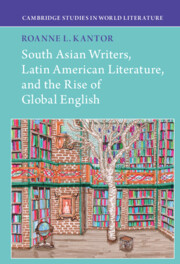Book contents
- South Asian Writers, Latin American Literature, and the Rise of Global English
- Cambridge Studies in World Literature
- South Asian Writers, Latin American Literature, and the Rise of Global English
- Copyright page
- Dedication
- Contents
- Figures
- Acknowledgments
- Introduction
- Chapter 1 Transmigrant
- Chapter 2 Stranger
- Chapter 3 Displacee
- Chapter 4 Pilgrim
- Chapter 5 Revenant
- Epilogue
- Notes
- References
- Index
Chapter 3 - Displacee
The Andalusian Allegory and Dreams of a Shared Past
Published online by Cambridge University Press: 17 February 2022
- South Asian Writers, Latin American Literature, and the Rise of Global English
- Cambridge Studies in World Literature
- South Asian Writers, Latin American Literature, and the Rise of Global English
- Copyright page
- Dedication
- Contents
- Figures
- Acknowledgments
- Introduction
- Chapter 1 Transmigrant
- Chapter 2 Stranger
- Chapter 3 Displacee
- Chapter 4 Pilgrim
- Chapter 5 Revenant
- Epilogue
- Notes
- References
- Index
Summary
This chapter shows how the countershelf can offer a “contrary” theory of global modernity hinged around the totemic date of 1492 – simultaneously the fall of Muslim Spain and the violent opening of the “New World.” Approaching the quincentenary of these twinned traumas, novelists of the 1980s and 1990s linked them conceptually through a renovation of what had been a common theme in South Asian writing for more than a century: the Andalusian allegory. Gestures that “displace” waves of trauma in the subcontinent onto medieval Spain can be traced through Urdu writers including Hali, Abdul l’Halim Sharar, and especially Mohammad Iqbal. At the end of the twentieth century, Salman Rushdie, Intizar Husain, Tariq Ali, and Zulfikar Ghose creatively recapitulate these same affiliative projects, as did authors from the Americas, Octavio Paz and V. S. Naipaul. And yet, it was this same anxiety about comparable histories of colonization, in the very same moment of the 1990s, through which Latin America was pushed beyond the boundaries of the “postcolonial world.” The layered historical fictions of this chapter suggest a need to reevaluate postcolonial historiography on its own grounds.
Keywords
- Type
- Chapter
- Information
- Publisher: Cambridge University PressPrint publication year: 2022

